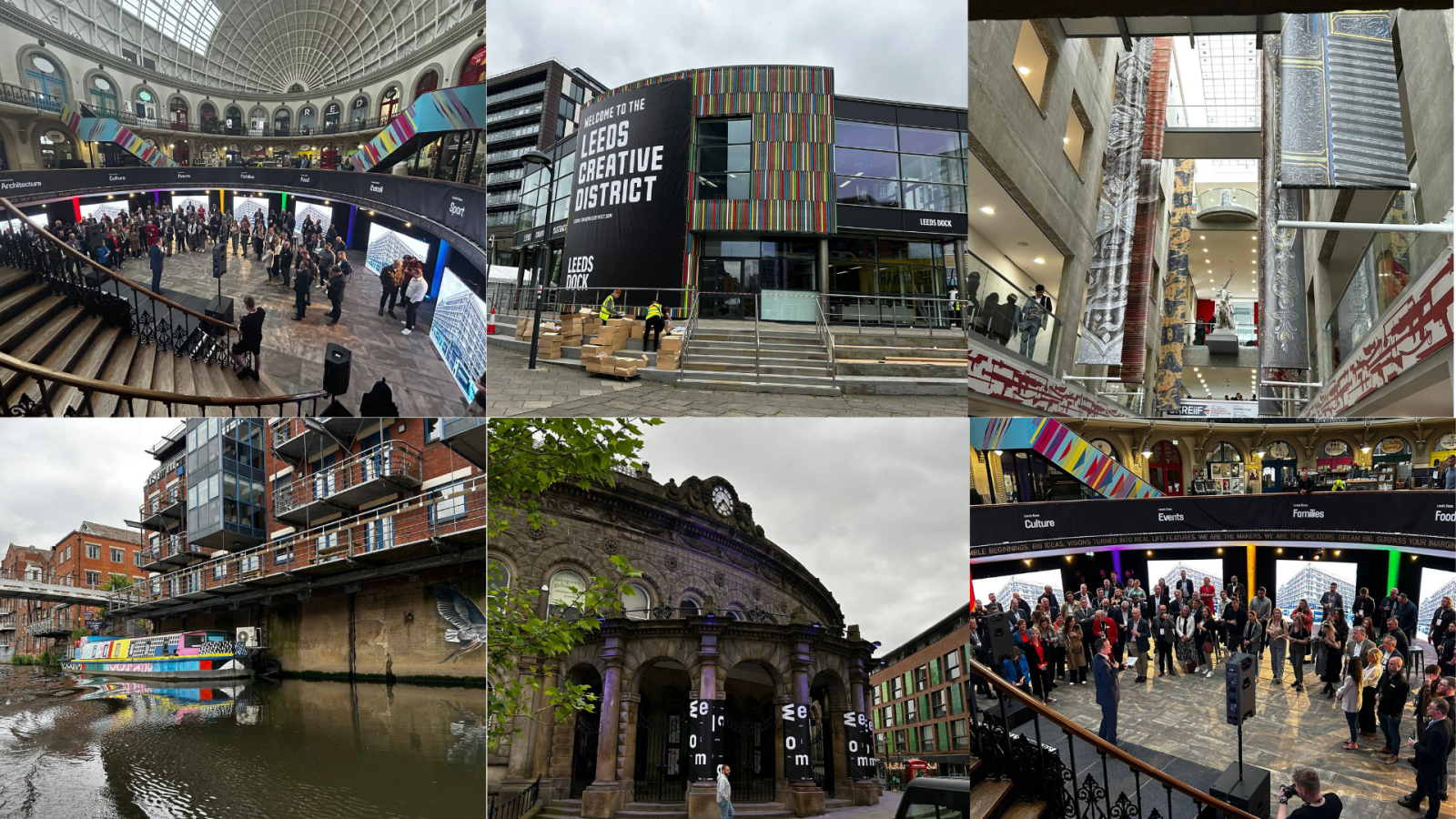UKREiiF Roundup for Reading
23rd May 2024
The UK’s Real Estate Investment and Infrastructure Forum (UKREiiF) is a multi-day industry event, this year held in Leeds, Yorkshire. Positioning itself as ‘a forum for unlocking investment and driving regeneration and development across the UK to accelerate economic growth’, the event showcases industry-leading speakers and a three-day programme of events and activities across the city.

REDA’s Chief Executive, Nigel Horton-Baker, was delighted to attend this year’s conference in Leeds city centre, alongside industry-leading investors, developers and occupiers, as well as regional authorities and government. From inspirational talks to networking sessions and a full events programme, it was an interesting and thought-provoking conference highlighting new trends and ideas to bring back to Reading. In particular, some key takeaways include:
The future of hybrid working
During the conference, engineering firm, Arup, hosted a discussion at their Leeds HQ, with representatives from Leeds, Sheffield and New York. KADA Research presented data on the impact of Covid on working patterns and levels of hybrid working, highlighting that around 44% of the UK’s office-based workforce is practicing hybrid working (with one day at home). A notably higher 80% of high earners are said to be working in a hybrid pattern, but this figure decreases in the younger population with just 26% of 16-24 year olds working from home. The impact on town centres has reportedly been significant, with an estimated loss of £3bn in spend.
Nonetheless, hybrid working has become the ‘new normal’ across the world, with some countries (including the UK, along with Canada, India, Singapore and Australia) working, on average, at least two days from home. KADA Research highlighted that the current UK office occupancy rate stands at around 35%, compared with the US, at around 58%. It’s perhaps not surprising, that, according to this data, a significant 63% of UK firms are looking to downsize offices, something which we are all too familiar with in Reading, in our post-Covid working environment.
Like Reading, Sheffield and Leeds were also reported to have seen a reduction in rail and bus travel, which remain below pre-Covid levels. Furthermore, KADA Research suggests that Sheffield and Leeds (based on an average two-days working from home) could have lost around £16m and £26m on their respective town centre economies.
However, to end on a positive note, the data concluded that businesses do not believe that hybrid working means the end of offices, but instead shows that businesses must remain agile enough to adapt to the new employee/employer need and, importantly, improve in the quality of space available. This is good news for Reading, which has around 1 million square foot of Grade A office space open to businesses looking to relocate and offer their staff premium working space.
Shift change in city-centre living
Cushman Wakefield, Aviva and Homes England presented Cushman’s Property Trends research, acknowledging the shift in city-centre living, with more residential developments providing homes for people within town and city centres. The research confirmed that the cities and towns which are likely to survive this change will be those that take a much more mixed-use approach to accommodating greater numbers of people living in their centres, along with health, and social services. Town centres were also discussed as a good place for older people in their retirement. The data suggested that shopping centres and malls will follow this model, with more leisure, arts and experiences aimed at dwellers as well as out of town visitors and local residents.
The discussion also focused on the importance of Business Improvement Districts for towns and cities, and how BIDs and local authorities have a key role to play in making their centres safer, cleaner, greener, and more vibrant. Innovation quarters in some places are also becoming a key component of town and city centres, linking in with universities’ expertise and/or health facilities, as well as encouraging entrepreneurs and start-ups.
In Reading, our well-established BID has just received a successful ballot to run for another five-year term, and its BID Plan sets out key priorities to continue to help our town centre thrive. REDA’s connections with the local authority, private and public sector, local businesses and charitable organisations within the town, alongside Reading’s core USPs such as connections, location and innovation, mean that we are well-placed to benefit from any potential shift in trend with city-centre living.
Importance of partnerships in driving economic growth
A panel of sub-regional partnerships across the country, including Northern Powerhouse (NP11), Midlands Engine, Western Gateway, Oxford to Cambridge Regional Partnership, Great South-West partnership, and UK Innovation Corridor, discussed the importance of partnerships in driving economic growth. While inspiring to see these partnerships developing visions and globally competitive offers to attract investment to their regions, it has, however, highlighted a large white space across the South-East, and in particular the previously designed South-East England Development Agency (SEEDA) region, an area lacking, in my opinion, strong partnership and a solid vision for its economic growth.
A daunting and difficult task, perhaps, but every part of the UK needs to be firing on all cylinders to collectively drive the UK’s economic growth. Reading sits at the very heart of the South-East powerhouse, arguably stronger together with the other Berkshire authorities, but still a minor player when compared with other regional partnerships. Should we be encouraging a dialogue around our regional economic partnership ‘white space’, before it’s too late?
One big ask I took away from the panel (and agree it would help Reading, Berkshire and the South- East, as well as the other regional partnerships), is for the new Government voted in on 4 July to work with these partnerships and public and private sectors to develop a new, much-needed Industrial Strategy for the UK.
Concluding thoughts
With over 1500 investors and developers, over 750 occupiers and over 250 local authorities, alongside many contractors, agents and other place-based attendees, UKREiiF was an effective forum to connect with other people, places and businesses from across the country. The three-day event featured some inspirational talks from industry leaders, thought-provoking discussions, panels and networking sessions, and a jammed-packed programme of activities across the city. I’ve certainly taken some thoughts and ideas back to Reading and look forward to seeing where partnership working and place making takes us in 2025.
A blog by Nigel Horton-Baker







